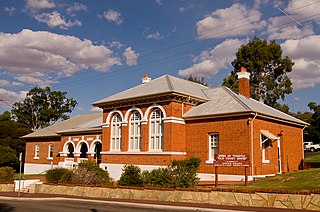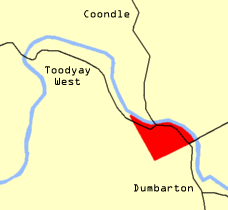
Toodyay, known as Newcastle between 1860 and 1910, is a town on the Avon River in the Wheatbelt region of Western Australia, 85 kilometres (53 mi) north-east of Perth. The first European settlement occurred in the area in 1836. After flooding in the 1850s, the townsite was moved to its current location in the 1860s. It is connected by railway and road to Perth. During the 1860s, it was home to bushranger Moondyne Joe.

James Drummond was an early settler in Western Australia, and a member of the Western Australian Legislative Council from 1870 to 1873.

The Shire of Toodyay is a local government area in the Wheatbelt region of Western Australia, beyond the north-eastern limits of the Perth metropolitan area. The Shire covers an area of 1,694 square kilometres (654 sq mi), and its seat of government is the town of Toodyay.

The Shire of Northampton is a local government area in the Mid West region of Western Australia, about 50 kilometres (30 mi) north of Geraldton and about 460 kilometres (290 mi) north of the state capital, Perth. The Shire covers an area of 13,738 square kilometres (5,304 sq mi), and its seat of government is the town of Northampton, with the largest settlement being Kalbarri.
Charles Edward Dempster was a politician in Western Australia, serving two terms in the Legislative Council—as the member for the seat of Toodyay from 1873 to 1874, and as one of the three East Province members from 1894 until 1907. A farmer and grazier by trade, he was also one of the first European explorers of the Esperance district as well as a councillor and chairman on the Toodyay and Northam Road Boards for many years.

Toodyay Public Library is located on Stirling Terrace in Toodyay, Western Australia.

The Municipality of Newcastle was a local government area in the Wheatbelt region of Western Australia, about 85 kilometres (53 mi) north-east of Perth. The municipality covered an area of 395 acres (1.60 km2), existed from 1877 until 1912, and was based in the town of Toodyay, which was known as Newcastle until 1910.

The Toodyay Memorial Hall is a heritage-listed building on Stirling Terrace in Toodyay, Western Australia. It was originally built in 1899 as the Newcastle Municipal Chambers, then substantially extended in 1910, with further extensions in 1956–57 and 1990–92.

Stirling Terrace is the main street of Toodyay, Western Australia, originally called New Road until 1905.

Dr Growse's House is located on Stirling Terrace in Toodyay, Western Australia and was constructed in the early 1860s, possibly with convict labour.
The Roman Catholic Church Group, Toodyay is a site on Stirling Terrace in Toodyay, Western Australia, owned by the Catholic Church. This site was registered as Roman Catholic land in November 1861 in the newly proclaimed Avon District town of Newcastle. These buildings were erected here between the early 1860s and 1963:

Freemasons' Hotel is a historic building on Stirling Terrace in Toodyay, Western Australia. It was built for William Tregoning, and originally licensed in 1861 as the Newcastle Hotel. In 1977 the building was classified by the National Trust and given a permanent listing on the Register of the National Estate. It is also listed on the Australian Heritage Database.
Coondle is a small acre farming estate in the Shire of Toodyay in Western Australia. It started as an estate developed under the provisions of the Agricultural Lands Purchase Act (1896) near what was then known as Newcastle.
Joseph Strelley Harris (1811–1889) was a pastoralist in Western Australia. Between 1840 and 1888, he was a resident magistrate, serving in the towns of Williams, Toodyay, Busselton and Kojonup.
Arthur EdwardesGrowse was a well-loved and respected doctor who served the district of Toodyay in Western Australia from 1856 to 1872, then again for a year during 1876 to 1877. Growse was the second medical officer to serve Toodyay.
William Mayhew was a medical practitioner in the Toodyay district of Western Australia. Mayhew was appointed medical officer for Toodyay in 1872 when the previous doctor, Arthur Edwardes Growse was transferred to Guildford. His original vocation was that of a teacher, and he and his wife Alicia had come to Western Australia to take up appointments in this profession. It is assumed that Mayhew had acquired his medical training in England before his arrival in Western Australia in 1867.

The Toodyay Valley School was the first government school in Toodyay. It opened on 1 October 1855 with 55 children enrolled. Boarders were received on moderate terms.












